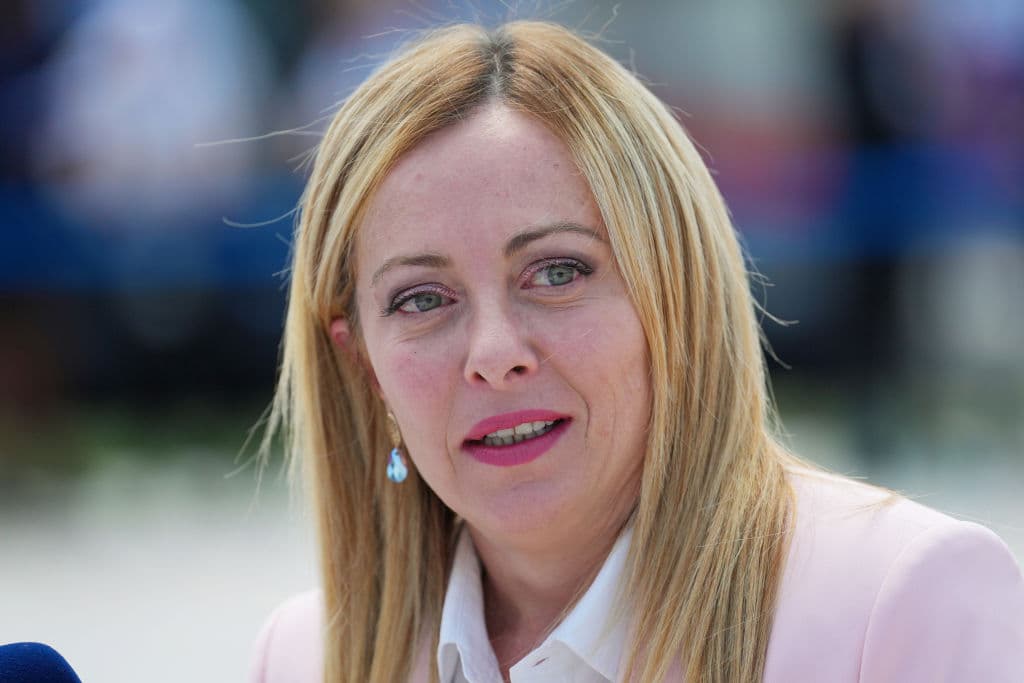The Die Is Cast: Italy’s Meloni, Crossing a Continental Rubicon, Stands for a Seat in the European Parliament
She describes herself as ‘the leader of the European conservatives who want to have a decisive role in changing the course of European politics.’

Prime Minister Meloni’s decision to run for a seat in the European Parliament in June amounts to crossing a political Rubicon of historic dimensions.
“We want to do in Europe exactly what we did in Italy on September 25, 2022 — creating a majority that brings together the forces of the right to finally send the left into opposition, even in Europe,” exclaimed the conservative premier.
Such a realignment would change how the Continent views itself. Is Europe a hodge-podge polity of demographically fading nationalities? Or will 198 million European voters cast their ballots for a restoration and renewal of the West’s civilizational values?
In a recent video address to Spain’s right-wing Vox party, Signora Meloni emphasized her position that “We are the engine of the rebirth of our Continent.”
The feckless European left, whose roots in Communist ideology cannot be ignored, long ago abandoned the notion that Europe is central to the preservation of freedom and the advancement of economic prosperity.
Indeed, many post-World War II European leftists favored the beliefs, values and twisted norms of the Marxist ideologue Antonio Gramsci, who advocated manipulating state power to achieve cultural hegemony.
However, electoral victories in a number of nations — especially Italy — have begun to shift the balance of power towards the conservatives, making this year’s parliamentary elections pivotal.
“The consequences may be substantial this time around,” Wall Street Journal columnist Joseph Sternberg contends, “precisely because of those feedback loops between European-level and national politics.”
A key concern is immigration, an issue that tilts European voters to the right. Moreover, it’s an area where Signora Meloni has already proven her bona fides, prevailing upon the incumbent president of the European Commission, Ursula von der Leyen, to adopt a more conservative stance.
And as Mr. Sternberg observes, “the presence of those lawmakers in the European Parliament can shift the debate on Continent-wide approaches to stemming inflows, while such an outcome will frighten national governments into tougher action on matters such as welfare eligibility for migrants and deportation of those who enter illegally.”
On a nuts-and-bolts level, Europeans will elect the 720 members of the legislature, which makes up one-third of the EU’s governing structure. The other two elements are the European Commission, a bureaucratic body, and the European Council, made up of the heads of EU member states.
The Parliament also elects the president of the Commission. And Signora Meloni’s deft diplomatic partnership with and support of the incumbent, Mrs. von der Leyen, gives the Italian premier added clout.
Per European Parliament rules, Signora Meloni must resign the seat at Brussels if she wins. The vacancy would then be filled as soon as possible by the Italian government, undoubtedly from the ranks of her party, Fratelli d’Italia.
Signora Meloni’s strategy for running, though, is to “establish herself as a parallel power center in a right-leaning European Parliament,” Anchal Vohra writes in Foreign Policy, giving her “unmatched influence on the commission president to push the body’s policy further right.”
Pedro Lopez, a spokesman for center-right European People’s Party, praises Signora Meloni for having “made several modifications to the Italian recovery plan,” which got “a green light from the EU commission.” He also pointed to the deals she cut with Tunisia and Egypt on migration. “She made sure Brussels took into account what matters for her Italian voters,” Mr. Lopez says.
In her role as prime minister of Italy, Signora Meloni is urging conservative voters — whom she has addressed as patriots — throughout the Continent to rediscover the pride in their history and their identity by voting for a woman called Giorgia.
“I’m doing it because in addition to being president of Brothers of Italy I’m also the leader of the European conservatives who want to have a decisive role in changing the course of European politics.”
In addition to her soaring peroration, the Italian premier has a solid record of achievement on her watch. Italy’s GDP is 4.6 percent larger today than before the pandemic — outshining Germany’s paltry economic growth. And the Magic Boot’s stock-market performance mirrors the economic trend: Italy’s leading stock index, the FTSE MIB, has delivered a total return of 37 percent over the past year.
Three of the top-10 performers in the Stoxx Europe 600 index over the past year are Italian banks: Banca Monte dei Paschi di Siena, Banca Popolare di Sondrio, and UniCredit.
Aside from scatter-shot broadsides and scandal-mongering theatrics, the hard left of Elly Schlein’s Partito Democratico and the left-leaning Movimento Cinque Stelle, or Five Stars, have no coherent vision for Italy or the European Union.
A long-ago “complex set of rules that assured the state wasn’t torn apart by private political interest, ” a Belgian political leader, Jan Jambon, observed in a recent Politico article.
“Roman thinking about citizenship, community and freedom,” Mr. Jambon added, “however narrow in its application — brought us the rule of law we consider sacred today.”
Prime Minister Meloni’s vision for Europe harkens back to that ancient Roman legacy of unity.

